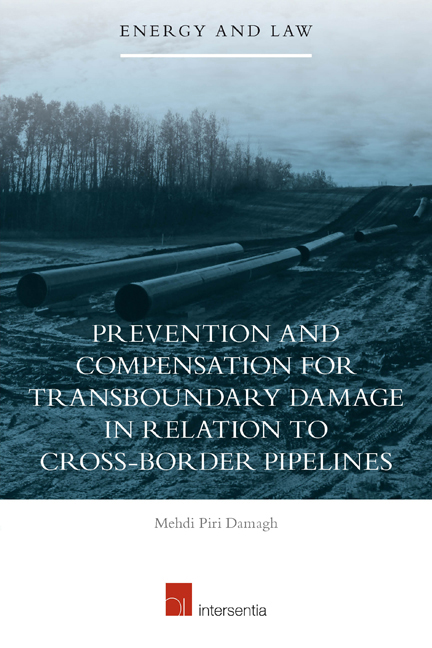Book contents
- Frontmatter
- Dedication
- Acknowledgements
- Contents
- Abbreviations
- List of Tables and Maps
- Chapter 1 Introduction
- PART I INTRODUCTORY ISSUES: PIPELINES, THE NATURE OF RISKS ASSOCIATED WITH PIPELINES AND THEIR REGULATORY REGIMES
- PART II PREVENTION OF CROSS-BORDER PIPELINE ACCIDENTS – MEANS AND SOURCES
- Introductory Note
- Chapter 5 Technical, Safety and Environmental Regulations
- Chapter 6 The Obligations to Prevent Trans-boundary Damage Caused by Crossborder Pipelines
- Chapter 7 An Evaluation of the Safety and Environmental Regulations of Crossborder Pipelines
- PART III STATE RESPONSIBILITY FOR TRANS-BOUNDARY DAMAGE CAUSED BY PIPELINES
- Summary
- Bibliography
- Valorisation Addendum
- Curriculum Vitae
Introductory Note
from PART II - PREVENTION OF CROSS-BORDER PIPELINE ACCIDENTS – MEANS AND SOURCES
Published online by Cambridge University Press: 13 December 2017
- Frontmatter
- Dedication
- Acknowledgements
- Contents
- Abbreviations
- List of Tables and Maps
- Chapter 1 Introduction
- PART I INTRODUCTORY ISSUES: PIPELINES, THE NATURE OF RISKS ASSOCIATED WITH PIPELINES AND THEIR REGULATORY REGIMES
- PART II PREVENTION OF CROSS-BORDER PIPELINE ACCIDENTS – MEANS AND SOURCES
- Introductory Note
- Chapter 5 Technical, Safety and Environmental Regulations
- Chapter 6 The Obligations to Prevent Trans-boundary Damage Caused by Crossborder Pipelines
- Chapter 7 An Evaluation of the Safety and Environmental Regulations of Crossborder Pipelines
- PART III STATE RESPONSIBILITY FOR TRANS-BOUNDARY DAMAGE CAUSED BY PIPELINES
- Summary
- Bibliography
- Valorisation Addendum
- Curriculum Vitae
Summary
Cross-border pipelines may lead to two distinctive types of damage: trans boundary and trans-national damage. Although both of them vary in nature and elements, both share multi-faceted international dimensions. The international dimensions of such damage of course in a way complicate regulating cross-border pipelines and hence highlight the necessity of examining the current status of the regulatory regime of cross-border pipelines in more detail.
In the context of trans-boundary damage, including damage caused by oil and gas pipelines, prevention is closely related to responsibility and liability. In fact, as will be discussed later in the next chapters of this research, state reasonability is only triggered when a state has failed to comply with its international obligations. States under conventional and treaty law have obligations to prevent trans-boundary damage. These obligations may consist of clear regulations that require safe practices. Failure to comply with these rules in the case of trans-boundary harm may bring international responsibility to the obliged state. The states may be also required to adopt appropriate regulatory measures in order to prevent trans-boundary damage. Therefore, the international obligations of the states comprise a significant part of the general norms of the state responsibility regarding trans-boundary damage.
The questions may arise concerning what are the safety and environmental regulations of the cross-border oil and gas pipelines, who should regulate such activities and ultimately who should enforce such regulations. In response to the first question, we will describe the safety and environmental standards applicable to oil and gas pipelines without reference to what has been required by the binding law. This is because the safety and environmental regulations applicable to oil and gas pipelines are often of a general nature which could be applied to cross-country and cross-border regulations. Indeed, this is the enforcement mechanism which involves transnational multi-level actors and so is more complicated in cross-border pipelines. In response to the second question, we will analyse the standard setting in the oil and gas pipeline sector. In doing so, we examine which type of these regulatory instruments can better fit with the safety and environmental regulations of cross-border pipelines.
- Type
- Chapter
- Information
- Prevention and Compensation for Transboundary Damage in Relation to Cross-border Oil and Gas Pipelines , pp. 185 - 188Publisher: IntersentiaPrint publication year: 2015

